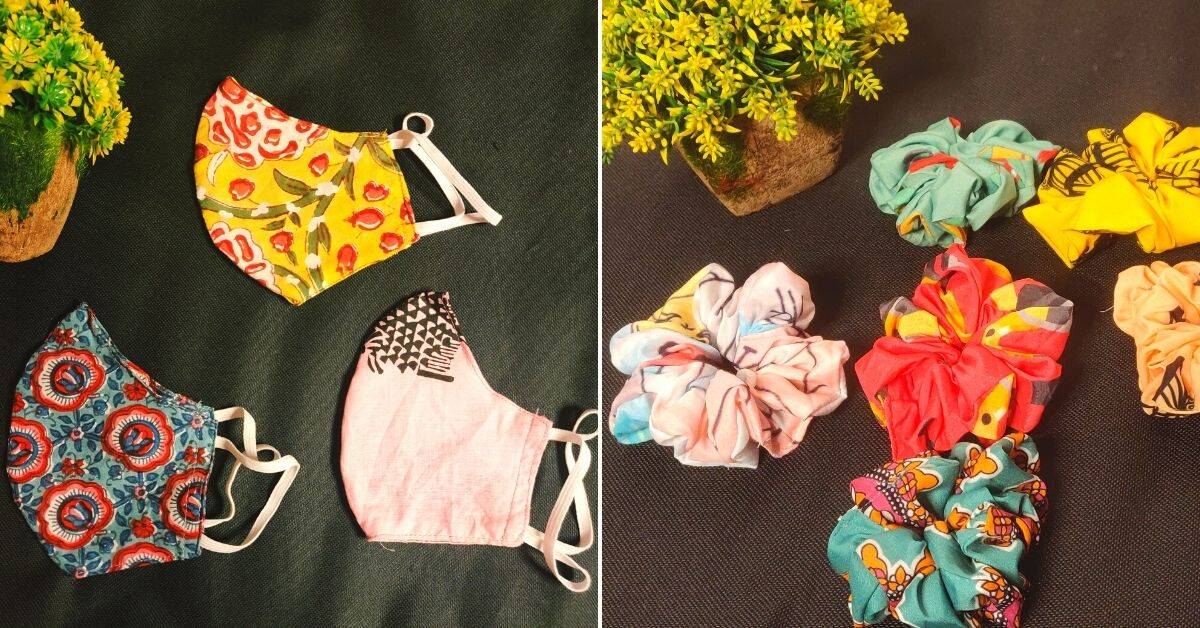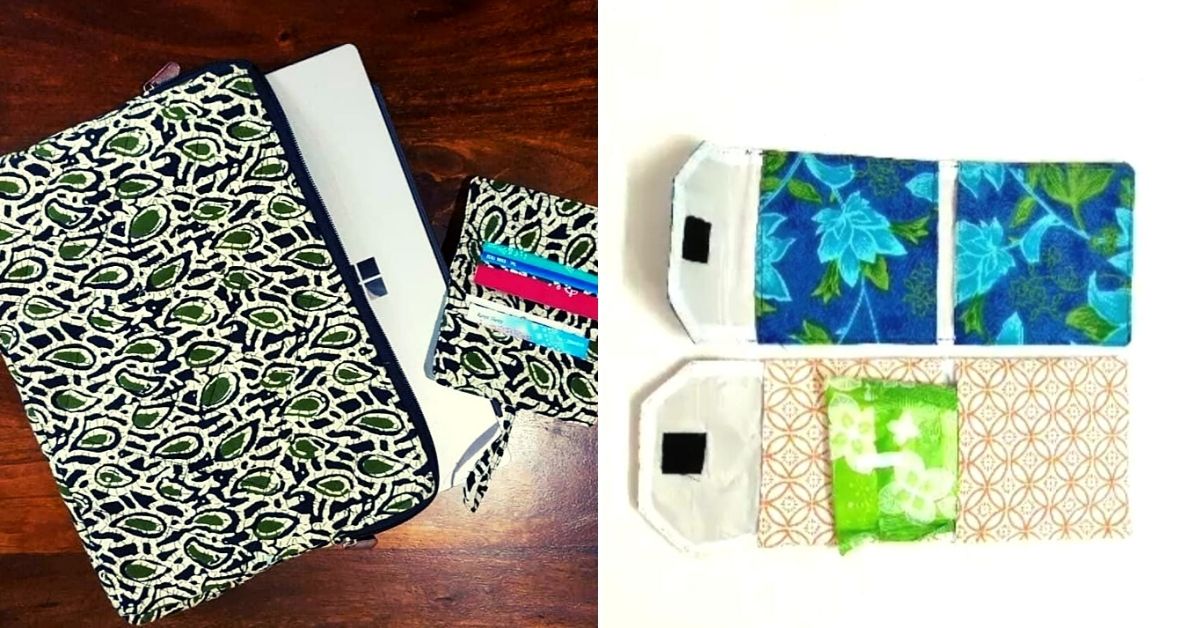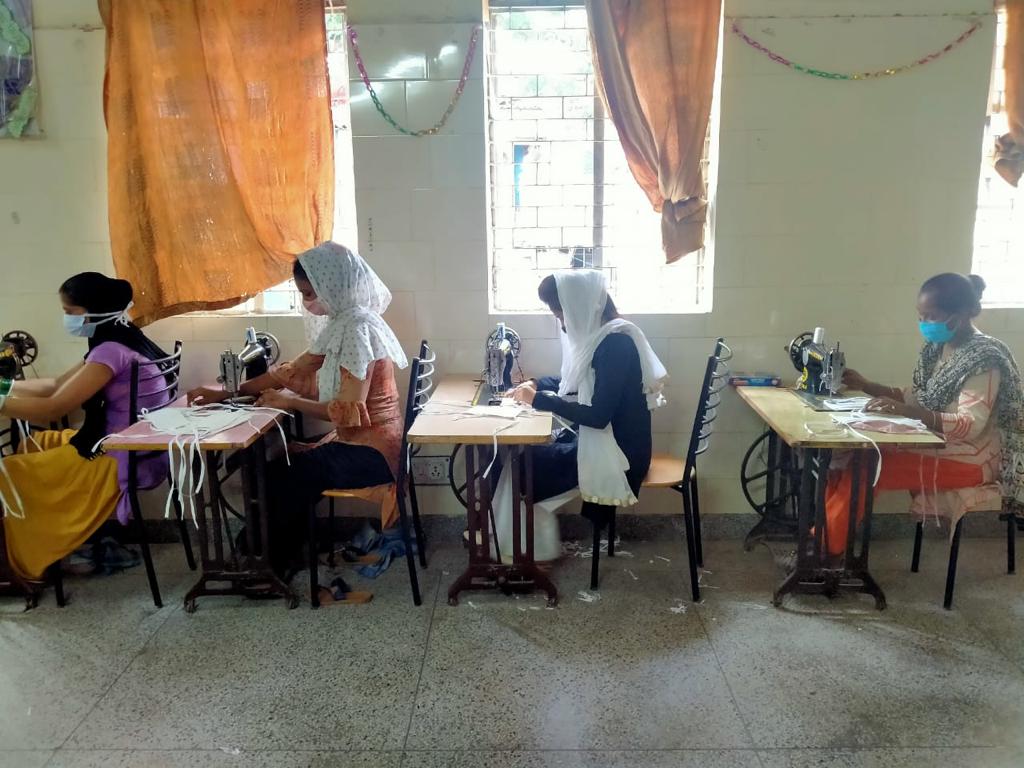Gurmeen Shrivastav, a Mumbai-based fashion designer who runs her own custom-made brand ‘Nayshaas_siyahi_sa_vastra’, named after her daughter. She owns a studio in Malad West and has been helping about 30 underprivileged women in the city earn a regular livelihood throughout the pandemic in conjunction with Srujna, a Mumbai-based non-profit organisation.
(Image above of Gurmeen Shrivastav on the left and the women she is working with on the right)
“As a brand, we wanted to help during the first wave of COVID-19 and gave them a livelihood. Starting from April 2020, we gave them our materials, fabric and mentored them on designs, exact measurements, labelling and how to make items like face masks, earrings, hair bands, scrunchies, and other items. These women are fast learners, keen on picking up new things and determined to support their families. These qualities, in turn, helped us give them more work. After the first lockdown, we informed people from the fashion world or those associated with our brand about our work in helping these women. Within hours, we managed to sell everything they had made,” says Gurmeen, speaking to The Better India.
They made double layered and three layered masks for our brand nayshaas_siyahi_sa_vastra and these are digitally printed. Also some of these masks have embroidery on it. The small embroidery motifs were also made by these ladies.
“The material is very soft and comfortable to wear and yet safety comes first so we used a thin filter layer as well in between the two layers. Meanwhile, for earrings we worked on zero-waste ones. We used our printed cotton material and paired it with oxidised hangings and developed beautiful earrings out of it,” says Gurmeen.

This year they’re making sanitary pouches, laptop sleeves, cloth hand bags and other items. They’ve not asked these women to make masks nowadays because doctors have recommended N95. But they ended up making other products with her materials, design, brand name and mentorship.
“We have used our leftover materials to make scrunchies and hair bands too. We used our signature prints to develop these accessories. We used soft cotton and also crepe materials with lining inside to develop these nice sanitary pouches,” she adds.
All these products are priced between Rs 200 to Rs 500 per piece. Gurmeen ends up buying these items from these women at inflated prices.

Ask Pratibha Berde, a resident of Sion Koliwada in Shastri Nagar.
“There are around 10 more ladies working with me. Last year during the lockdown we got an opportunity to work for Gurmeen Didi, and this really helped all of us and our families. The profit that I earned out of it helped me pay my daughter’s school fees. I would like to thank her and hope that she keeps giving us more work,” says Pratibha.
Meanwhile, Varsha works with a team of about 15 women in conjunction with Srujna. “Last year, we worked with Gurmeen Didi to make masks. This year too we are working with her. We benefited a lot because of all the work she is giving us. We are thankful, “ she says.
Since 2018, Gurmeen has been associated with these women and Srujna. Back then, they were stitching cloth bags with her brand name attached to it. This is why last April, she asked the people at Srujna about the condition of these ladies. Once she was given a brief on their situation and about the struggles they were going through during the pandemic., Gurmeen decided to give them more work and help them earn a living.
“When I opened my studio in 2018, I was looking for vendors who could help make cloth bags for us. When I looked into the market, I figured why give my money to these vendors, who already have a tonne of business. Instead, why not give this business to people who need it? That’s when I began looking into credible NGOs in this space and came across the work Srujna was doing with underprivileged women in Mumbai. It provides skill training, grooms marginalised women for business training and provides market linkage for their products. It works with multiple NGOs, corporates, self-help groups and artisans, and brings them together on one platform,” says the 37-year-old designer.
But at the heart of all her efforts is a sense of kinship she feels with these women.
“When I first met these women in 2018, I got to know them well, their families and the pressures they deal with on a daily basis. Also, I have a lot of women in my team and feel so connected to them. That’s why I wanted to help these women in whatever way possible. Even though the price they charge in making these items is more than the market rate, I’m okay with it because I know this money is helping people. Back in 2018, they made almost 500 cloth bags for our brand packaging. Srujna has a massive network of underprivileged women, but about 30 of them work with us,” she claims.

Accommodating Other Women
Gurmeen is originally a native of Chandigarh, where she studied fashion designing following which she found her first job at a domestic retail brand. A couple of years later, she moved to Delhi where she worked at an export house for nearly three years, which was followed by a stint as a senior manager at another big export firm in Mumbai.
After marriage, however, she took a break from work and gave birth to a daughter as well. After freelancing for a while, she started her own label in 2012 and named it after her daughter Naysha. The reason why she named it after her daughter has deeply personal roots.
“When I delivered Naysha, I had put on a lot of weight. I saw that the clothes in my wardrobe weren’t fitting anymore. In retail brands, they largely don’t provide female customers with extra margins that we can alter and wear clothes for longer durations. I wanted to create a brand for ladies who put on weight during or after pregnancy, giving them the extra margins and helping them wear their clothes for longer durations. We are the only brand offering this service. Our objective is to accommodate other women who don’t fit clothes made for conventional body sizes. The spirit of accommodation is what, I guess, led us to helping these women alongside Srujna,” she notes.
(Edited by Yoshita Rao)
No comments:
Post a Comment